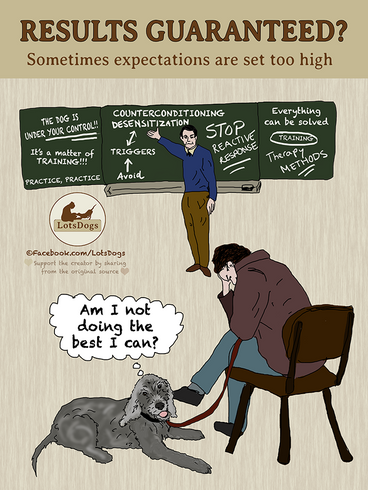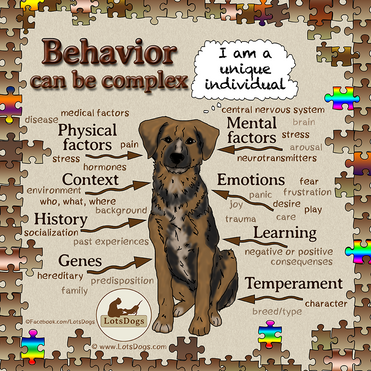Results Guaranteed?
Often, when people discuss dog behaviour I see words being used like ‘results’, ‘methods’, ‘what works’, ‘tools’, etc. It all gives rise to the notion that humans are capable of manipulating and shaping all dog behaviour to our liking. If it is not ‘working’, then you are not using the right ‘method’ or maybe it is you that is failing, maybe your dog’s behaviour is actually your fault. Is that fair?
Although I know and I’ve seen and I’ve experienced many incredibly impressive results from training and/or therapy sessions, I also know, see and have experienced cases where progress was made, but the results were not what was hoped or expected.
In this article I would like to offer support and understanding to people who are doing their absolute best for dogs that have trouble coping and behaving in the way that humans want and expect them to behave.
I believe that, instead of only focussing on changing dog behaviour, it is more important to focus on safeguaring and improving the welfare of all involved. Changing the behaviour can be an very imporant part in achieving that goal, but sometimes it is necessary to adjust expectations to be more realistic, in order for all family members to cope and be able to share their lives together in the best possible way.
Dogs are complex mammals with a highly evolved central nervous system. Each dog is a unique individual and behaviour is influenced by a lot more than just learning experiences. I do not think it’s fair to guarantee results as a dog trainer. Not every behaviour problem can be solved by training only.
Think about the strong influence of genetics (breed/type/ancestry), hormonal balance, medical factors or maybe even the balance between neurotransmitters within the brain/nervous system which can strongly influence the emotional state of animals and their behavioural responses.
Also consider the influence that stress can have on the threshold for ‘explosive’ behaviour and on the learning capabilities of dogs and then consider the fact that we humans are not always able to completely control all environments that we expose our dogs to.
Humans expose dogs to all kinds of environments that were mainly designed by humans, for human life. Although dogs are highly domesticated animals, human needs do not always match with the needs of dogs.
Just like humans (and other mammals), dogs can suffer from mental illnesses and psychiatric disorders (depression, anxiety, trauma). It is not strange when you find out that most behavioural medication is tested on other mammals (i.e. rats) first, before they are used for humans.
Many times, dogs need more than training. They can be in need of help from a veterinary behaviourist (a psychiatrist for dogs), who is not only specialized in the working of animal bodies, but also in the brain and behaviour of animals.
Be careful not to judge people who are struggling with their dog’s behaviour too quickly. It is not always their fault and it is not always caused by dog training failure.
Just like some humans, some dogs need close guidance and ongoing treatment for the rest of their life, in order for them to cope in their living environment.
© LotsDogs | Written by Liselot Boersma, welfare consultant (PgDip CABW) and owner of LotsDogs, februari 2017; translated in 2020. Copy paste of images or text is forbidden. Sharing the URL of this website is very much appreciated. Many thanks in advance.



